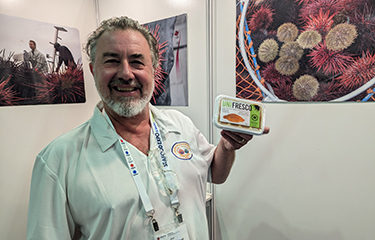The sea urchin industry in Canada has always faced a seemingly insurmountable challenge: the limited shelf life of its product.
On the coast of British Columbia, Canada, giant red sea urchins offer a valuable roe, or uni, resource. The urchin’s larger size, the fishery’s sustainability, and the quality of the product have all helped the product gain a foothold in multiple markets.
Despite the product’s successes, Fraser Rieche, a board member at the Canadian Pacific Sustainable Fisheries Society, told SeafoodSource that the fishery has been largely unable to access one market: Europe.
“We were faced with the challenge in the sea urchin industry in Canada where we were having a very difficult time accessing the European market,” he said. “It [stems] from the short shelf life of sea urchin roe.”
With no treatment, sea urchin roe has a shelf life of roughly two days, making it difficult to ship far without further treatment. With aluminum sulfate, Rieche said, the shelf life extends to seven or 10 days. The problem lies, however, in the fact that aluminum sulfate is a banned food additive in Europe.
As a result, the European market has been inaccessible to urchin companies in Canada; the transit time is too long for the short untreated shelf life.
“We had to come up with a way of extending the shelf life without using aluminum sulfate,” Rieche said.
That goal was the primary focus of UniFresco, where Rieche works, and the company worked for two years to figure out how to process the product without chemicals in a way that also extends its shelf life. Now, the company has settled on a new process that Rieche said should finally open up the European market – and beyond.
The process, Rieche said, involves “strict temperature control during processing” coupled with a series of washes and brines, finished off by packing in natural seawater and using high-pressure pasteurization to finish the product off. UniFresco completed this process over a year ago but stil had to jump through a series of hoops before it could officially export its uni overseas.
“We had to go through a series of testing protocols for Health Canada and for the Canadian Food Inspection Agency, and we had to get a peer-reviewed report written about our process to demonstrate that it actually had the shelf life claims that we were making,” Rieche said. “We are now the exclusive company in Canada that is able to manufacture and export fresh uni with the extended shelf life claims.”
The product's extended shelf life lasts even longer than traditional aluminum sulfate treatments used for other uni products. Rieche said the product is safe to eat up to 28 days after packaging, though UniFresco advises that people consume it before 20 days.
“We’re not using any preservatives; it’s completely clean label,” Rieche said. The unique processing also ensures the product contains much fewer pathogens, he said, and helps control for common concerns like vibrio, E. coli, salmonella, and more.
While the product's original intention was to penetrate the European market, the much longer shelf life has also opened up new markets. Asia, for example, is another possible market thanks to its longer shelf life.
“Asia is being effectively serviced by the traditional packs we have now, but we're now finding that there are logistics challenges in Asia that prevents the shorter shelf-life products from reaching intended markets,” Rieche said.
The product has already resonated with some high-end chefs.
Alchemist in Copenhagen, Denmark – a two-Michelin-star restaurant – has expressed interest in securing UniFresco’s products. In contrast to the smaller sea urchins available locally, which take extended amounts of time to process and often contain too little uni to make an impressive dish, UniFresco’s product is already processed and ready to eat.
“They like that they can bring in a product they can use in a dish and sell the day of,” Rieche said.
Smaller markets and restaurants that may not use the entire product in a few days are also a new option. Those markets are able to store the product for longer, alleviating any fears of buying a lot of uni and throwing half of it away.
Rieche added that the retail market is yet another option for the uni products. Due to the packaging and processing, the product is a bit more robust and can tolerate more handling.
“Ours will tend to last a little bit better in a refrigerated case with people handling it,” he said.
Rieche said UniFresco isn’t setting out to replace traditional uni products and packaging. Rather, it offers a new option and format for businesses that need it.
“I don’t want to replace the traditional uni pack, I can’t. People that are used to that, it’s a fabulous product,” Rieche said. “It’s a bit of an apples and oranges thing. Our product will fit a profile of customer ... that is not being met by the other formats.”
Photo by Chris Chase/SeafoodSource







